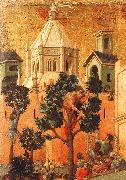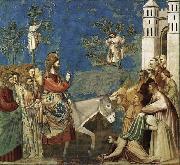Wholesale Oil Painting No Minimum |
|||||||||||
|
|
|||||||||||

|
|||||||||||
|
|
|
||||||||
Duccio di Buoninsegna1255-1318 Italian Duccio di Buoninsegna Locations Italian painter. He was one of the most important painters of the 14th century and like his slightly younger contemporary, Giotto, was a major influence on the course of Italian painting. An innovator, he introduced into Sienese painting new altarpiece designs, a dramatic use of landscape, expressive emotional relationships, extremely complex spatial structures and a subtle interplay of colour. His most important and revolutionary work, the Maeste for Siena Cathedral, was never matched during the 14th century, if at all, and his influence lasted well into the 15th century. |
||||||||
|
|
||||||||
Entry into Jerusalem
Entry into Jerusalem Painting ID:: 263 |
Museo dell'Opera del Duomo, Siena Museo dell'Opera del Duomo, Siena |
|||||||
|
|
||||||||
GIOTTO di BondoneItalian Early Renaissance Painter, 1267-1337 Italian painter and designer. In his own time and place he had an unrivalled reputation as the best painter and as an innovator, superior to all his predecessors, and he became the first post-Classical artist whose fame extended beyond his lifetime and native city. This was partly the consequence of the rich literary culture of two of the cities where he worked, Padua and Florence. Writing on art in Florence was pioneered by gifted authors and, although not quite art criticism, it involved the comparison of local artists in terms of quality. The most famous single appreciation is found in Dante's verses (Purgatory x) of 1315 or earlier. Exemplifying the transience of fame, first with poets and manuscript illuminators, Dante then remarked that the fame of Cimabue, who had supposed himself to be the leader in painting, had now been displaced by Giotto. Ironically, this text was one factor that forestalled the similar eclipse of Giotto's fame, which was clearly implied by the poet. |
||||||||
|
|
||||||||
Entry into Jerusalem
Entry into Jerusalem Painting ID:: 52386 |
1304-06 Fresco, 200 x 185 cm 1304-06 Fresco, 200 x 185 cm |
|||||||
|
|
||||||||
|
GIOTTO di Bondone Italian Early Renaissance Painter, 1267-1337 Italian painter and designer. In his own time and place he had an unrivalled reputation as the best painter and as an innovator, superior to all his predecessors, and he became the first post-Classical artist whose fame extended beyond his lifetime and native city. This was partly the consequence of the rich literary culture of two of the cities where he worked, Padua and Florence. Writing on art in Florence was pioneered by gifted authors and, although not quite art criticism, it involved the comparison of local artists in terms of quality. The most famous single appreciation is found in Dante's verses (Purgatory x) of 1315 or earlier. Exemplifying the transience of fame, first with poets and manuscript illuminators, Dante then remarked that the fame of Cimabue, who had supposed himself to be the leader in painting, had now been displaced by Giotto. Ironically, this text was one factor that forestalled the similar eclipse of Giotto's fame, which was clearly implied by the poet. Entry into Jerusalem 1304-06 Fresco, 200 x 185 cm |
||||||||
|
|
||||||||
|
Prev Next
|
||||||||
|
|
||||||||
|
Related Paintings to GIOTTO di Bondone :. |
||||||||
|
|
||||||||
|
CONTACT US |


